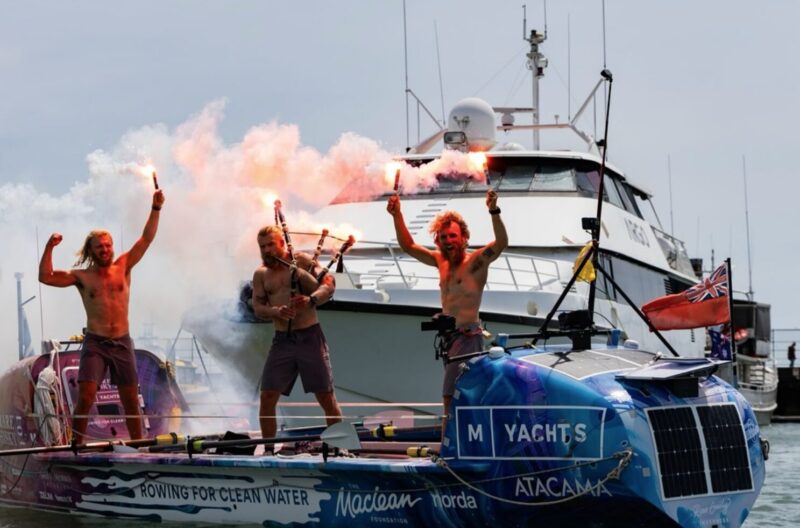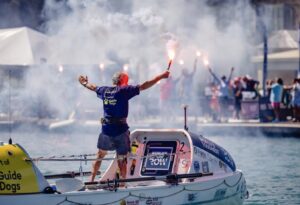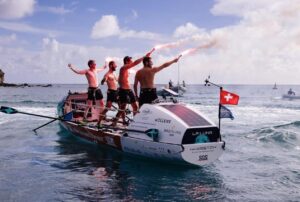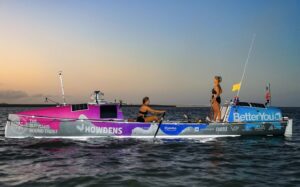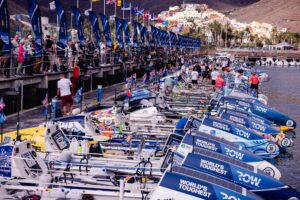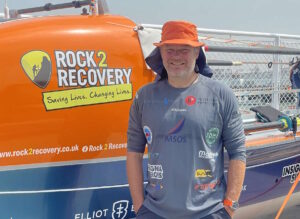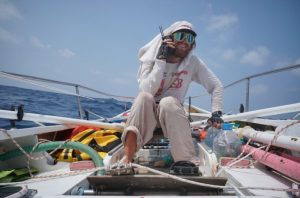Since our last ocean rowing roundup, one team has set a new record for crossing the Pacific Ocean. The two remaining crews are battling their way across the Pacific, getting steadily closer to their finish.
The Maclean Brothers (UK): Jamie, Ewan, and Lachlan MacLean have completed a record-breaking, unsupported row across the Pacific Ocean. Setting off from Lima, Peru, they spent 139 days, five hours, and 52 minutes at sea before arriving in Cairns, Australia, after covering 14,484km.
It is the fastest human-powered crossing of the Pacific. Soloist Fedor Konyukhov set the previous record of 162 days in 2014. In interviews, since completing the row, they have said “It almost feels like a dream,” and that they are still processing the scale of what they have achieved.
Life aboard their small rowing boat was far from easy. The conditions were relatively calm until halfway, when the winds and weather became much trickier.
Weather worsens
They faced an anti-cyclone, a 36-hour storm with winds up to 60kph and six-meter waves. They suffered several knockdowns, where the boat tipped quite violently onto its side. At one point, Lachlan was thrown overboard. Luckily, he was tied to the boat, and his brothers scrambled to haul him back on board.
As they neared the end of the row, a cyclone forced them to change their plans and head toward Cairns instead of Brisbane. They had to detour around the New Caledonia archipelago to avoid the storm. They had enough food to last 150 days. Unsure how the weather would affect them, they started rationing in the final few weeks to ensure they had enough to make it to Australia.
When they finally reached land, four friends with bagpipes piped them in from the marina walls, while Jamie played his own set of pipes from the boat. Stepping onto dry land, there were a few simple things they could not wait for — seeing family and friends, sleeping in an actual bed, and tucking into a long-imagined pizza.
The journey was exhausting both physically and mentally. Constant sleep deprivation, blisters, salt sores, and months living on dehydrated meals would be difficult for anyone.
Their superpower
They are convinced the key to their success, their “superpower,” was being brothers.
“You can be totally frank with each other, and we obviously have so much shared history, and that maybe means you are less likely to fall out,” Lachlan told the BBC.
Ewan added, “The days have been long and yet the weeks have flown past. It’s strange to think of the time that we’ve spent out here. This has been the hardest thing I’ve ever done, and I couldn’t have even contemplated it without my brothers.”
Seas the Day (UK): Jess Rowe and Miriam Payne have also been rowing from Peru to Australia. After initially starting in April, they had to turn back because of a broken rudder and restarted in May. As with the MacLean brothers, the constantly changing weather has forced them to amend their route. At first, they were heading for Sydney; this then changed to Brisbane, and now they are headed to Cairns in an attempt to escape the headwinds.
They have now been rowing for 130 days, and on September 3, they hit the three-quarter mark (around 9,600km) of their journey. To celebrate, while sitting in some “mountainous waves,” they opened a few small treats from their families — chocolate bars and dried strawberries.
A short-lived celebration
That joy was short-lived. By September 9, they were on their para-anchor because strong southerly winds were pushing them in the wrong direction. In total, they held in place for 55 hours.
You might think this would be a great time to catch up on sleep, but their bodies were so used to moving every few hours that sitting still in the cabin was actually hurting their backs. As well as this, it was damp and hot inside, increasing the discomfort. They couldn’t have been happier to start rowing again.
A few days ago, after weeks of many failed attempts, they caught a fish — a huge yellowfin tuna. This is the first fresh food they have had since setting off. Sacrificing a few crucial sleeping hours, Payne filleted the fish, cooked batches of it for the next few days, and even made some ceviche.
Louis Margot (CH): Louis Margot is rowing across the Pacific as part of a much larger journey. He is attempting to circumnavigate the earth by cycling and rowing. First, he cycled from Switzerland to Portugal, then rowed to Colombia. Here, he once again hopped on a bike and pedaled to Peru, where he started his second rowing leg.
Currently, he is rowing 14,000km across the Pacific Ocean to Indonesia. He has not done this in one go. He paused in Hiva Oa, one of the Marquesas Islands, for a few months to make repairs to his boat, restock, and rest. Then on June 1, he pushed off again, heading for Bali.
Milestones
This month has featured a number of milestones. August 23 was his 300th day at sea since the beginning of the challenge. Then, September 3 marked two years since the start of his circumnavigation. Over the 731 days since leaving Switzerland, he has traveled 29,700km using only human power. Once he reaches Indonesia, he will only have one final leg to complete: the return to Switzerland.
This section of the row has been incredibly hard for Margot. Not only have there been issues with his solar panels and navigation system, but it has also felt very isolating. He has now spent almost four months alone at sea, without seeing any land. He admits that leaving French Polynesia and restarting his row was one of his hardest moments. It took him a lot longer to readjust to life on board than he had anticipated, compared to previous rowing legs.
Luckily, in the last few weeks, a few moments have made him feel less alone. At one point, a huge fishing vessel passed alongside him, wanting to see what this tiny boat was doing in the middle of the ocean. They gave him a 24-pack of beer to keep him going. A few days later, he had a video call with Jess Rowe and Miriam Payne from Seas the Day. It was a huge morale boost to chat to other people who were also rowing across the Pacific.
In the last week, he has left the Pacific Ocean behind and crossed into the Bismarck Sea. The currents are moving in all directions, and several thunderstorms have crashed around him. He is steadily rowing past Papua New Guinea and other islands en route to Indonesia.
